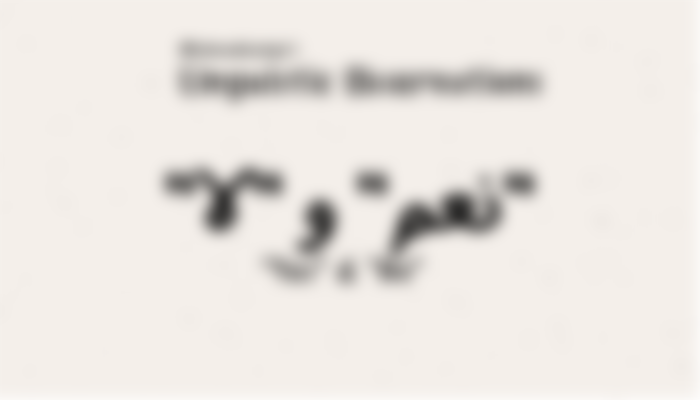Yes "نعم" and No "لا." Each Language has its ways to convey approval or the lack of it. Saying "yes" when we agree, and "no" when we don't is something so universally #human that I'm certain language that doesn't have words for "Yes" and "No." (...and I was wrong!)

I wanted to do a series of articles about my observations on the Arabic language & the local Libyan dialect, for a long time. I was encouraged by the @crossculture community on Hive. So I'm gonna start with a greeting.
The Arabic for "Yes" is "نعم." (Pronounced "Na'am.") It can be used in all ways the English "yes" is used it. When used to answer a question, it conveys approval, affirmation, or agreement.
The Arabic equivalent for "No" is "لا" ...It conveys disagreement or negation. It's simply pronounced "Laa."
Locally, in the western parts of Libya, we show agreement & disagreement in various ways different than the Standard Arabic. While we simply use the same "لا" for no.
The most common way to say "yes" is "إيه" which is actually pronounced "Eih" instead of "نعم."
Negative questions work similarly in English and Arabic. I'm referring to questions like "Don't you want to learn a new language?" In which a "Yes" answer means confirming the question's assumption: "Yes, I don't." They're a bit confusing, aren't they?
It works similarly in Standard Arabic (both modern or classical.) "نعم" agrees with the negative part of the question. But if you disagree, you should use a special word for negative questions: "بلى." It's a strong "yes" word that's only used for a positive answer to a negative question!
While "بلى" is integral to Standard Arabic, we don't use it locally. When we're faced with negative questions, we don't expect a "yes" or "no" as an answer but we look for the context and tone of the answer. From experience though, we usually answer a negative question as if the negative part of it doesn't exist.
"Aren't you confused?"
"No, I'm not!"
(...Instead of "yes, I'm not" which is grammatically correct.)
What do you think?
So, that was my take on the use of Yes & No, in standard Arabic and the western parts of Libya where I live. I omitted the eastern Libyan dialect because I can't speak it and haven't made enough contact with its speakers. Libyan Arabic is that strange... I'm thinking of writing a more general article about that another time...
This article was more difficult to write than I imagined, hope you understood it, but if you didn't please tell me what parts you think I should make more clear.
The article's image is made with Canva.
This article is also posted on Hive's PeakD.
